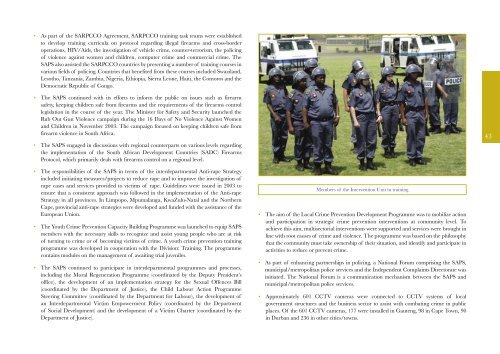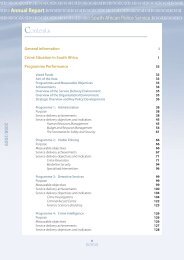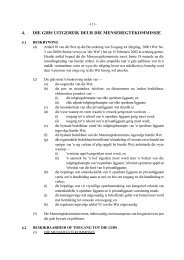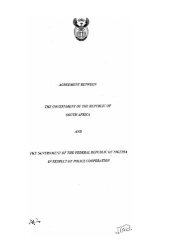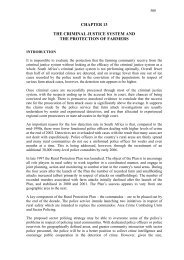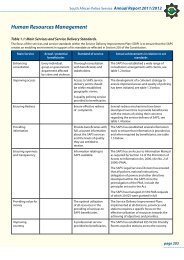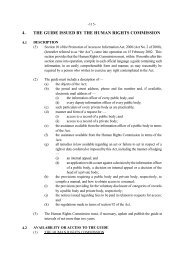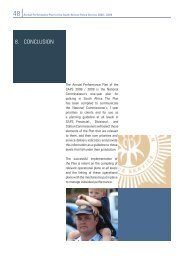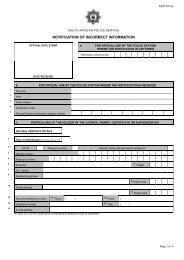Untitled - Saps
Untitled - Saps
Untitled - Saps
You also want an ePaper? Increase the reach of your titles
YUMPU automatically turns print PDFs into web optimized ePapers that Google loves.
• As part of the SARPCCO Agreement, SARPCCO training task teams were established<br />
to develop training curricula on protocol regarding illegal firearms and cross-border<br />
operations, HIV/Aids, the investigation of vehicle crime, counter-terrorism, the policing<br />
of violence against women and children, computer crime and commercial crime. The<br />
SAPS also assisted the SARPCCO countries by presenting a number of training courses in<br />
various fields of policing. Countries that benefited from these courses included Swaziland,<br />
Lesotho, Tanzania, Zambia, Nigeria, Ethiopia, Sierra Leone, Haiti, the Comoros and the<br />
Democratic Republic of Congo.<br />
• The SAPS continued with its efforts to inform the public on issues such as firearm<br />
safety, keeping children safe from firearms and the requirements of the firearms control<br />
legislation in the course of the year. The Minister for Safety and Security launched the<br />
Rub Out Gun Violence campaign during the 16 Days of No Violence Against Women<br />
and Children in November 2003. The campaign focused on keeping children safe from<br />
firearm violence in South Africa.<br />
• The SAPS engaged in discussions with regional counterparts on various levels regarding<br />
the implementation of the South African Development Countries (SADC) Firearms<br />
Protocol, which primarily deals with firearms control on a regional level.<br />
43<br />
• The responsibilities of the SAPS in terms of the interdepartmental Anti-rape Strategy<br />
included initiating measures/projects to reduce rape and to improve the investigation of<br />
rape cases and services provided to victims of rape. Guidelines were issued in 2003 to<br />
ensure that a consistent approach was followed in the implementation of the Anti-rape<br />
Strategy in all provinces. In Limpopo, Mpumalanga, KwaZulu-Natal and the Northern<br />
Cape, provincial anti-rape strategies were developed and funded with the assistance of the<br />
European Union.<br />
• The Youth Crime Prevention Capacity Building Programme was launched to equip SAPS<br />
members with the necessary skills to recognize and assist young people who are at risk<br />
of turning to crime or of becoming victims of crime. A youth crime prevention training<br />
programme was developed in cooperation with the Division: Training. The programme<br />
contains modules on the management of awaiting trial juveniles.<br />
• The SAPS continued to participate in interdepartmental programmes and processes,<br />
including the Moral Regeneration Programme (coordinated by the Deputy President’s<br />
office), the development of an implementation strategy for the Sexual Offences Bill<br />
(coordinated by the Department of Justice), the Child Labour Action Programme<br />
Steering Committee (coordinated by the Department for Labour), the development of<br />
an Interdepartmental Victim Empowerment Policy (coordinated by the Department<br />
of Social Development) and the development of a Victim Charter (coordinated by the<br />
Department of Justice).<br />
Members of the Intervention Unit in training<br />
• The aim of the Local Crime Prevention Development Programme was to mobilize action<br />
and participation in strategic crime prevention interventions at community level. To<br />
achieve this aim, multisectorial interventions were supported and services were brought in<br />
line with root causes of crime and violence. The programme was based on the philosophy<br />
that the community must take ownership of their situation, and identify and participate in<br />
activities to reduce or prevent crime.<br />
• As part of enhancing partnerships in policing, a National Forum comprising the SAPS,<br />
municipal/metropolitan police services and the Independent Complaints Directorate was<br />
initiated. The National Forum is a communication mechanism between the SAPS and<br />
municipal/metropolitan police services.<br />
• Approximately 601 CCTV cameras were connected to CCTV systems of local<br />
government structures and the business sector to assist with combating crime in public<br />
places. Of the 601 CCTV cameras, 177 were installed in Gauteng, 98 in Cape Town, 90<br />
in Durban and 236 in other cities/towns.


